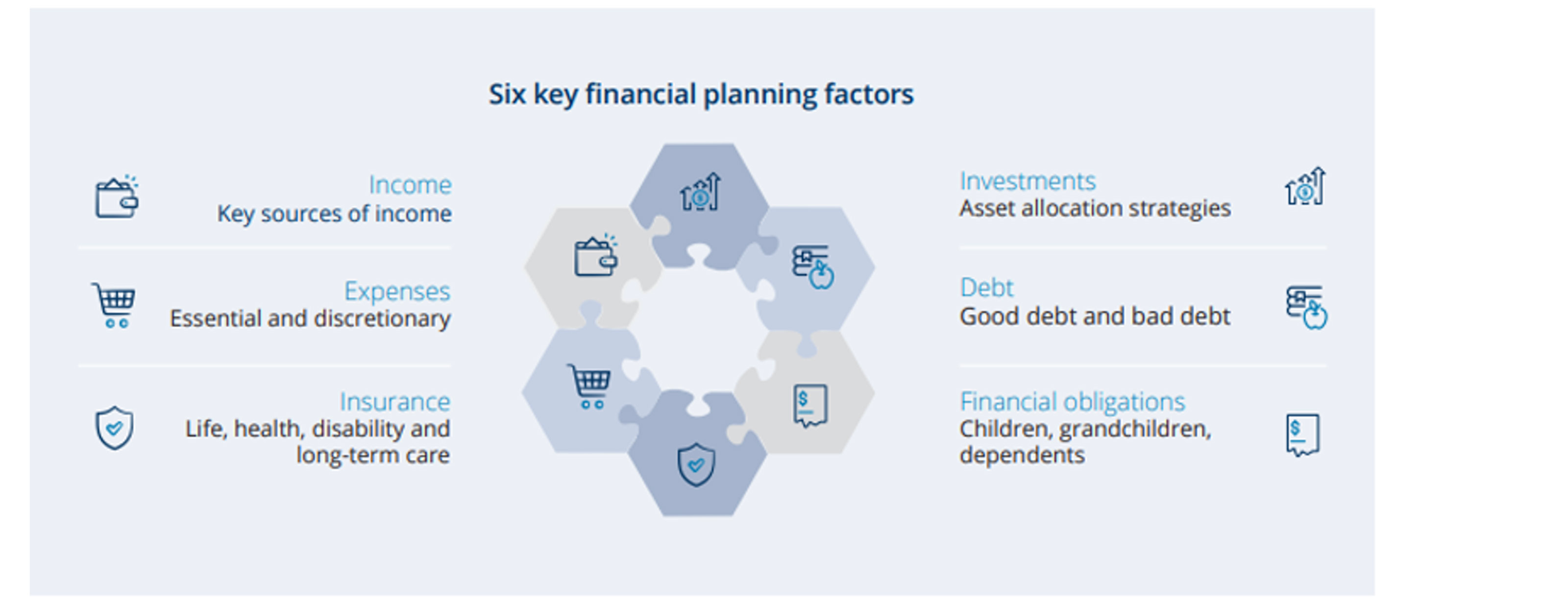Financial Conversation Starters for Couples
Instead of reaching for the remote and an evening of Netflix, why not get really intimate … and talk about money instead? Sharing the same financial goals and being open about how you’re doing can be great for your relationship.


Profit and prosper with the best of Kiplinger's advice on investing, taxes, retirement, personal finance and much more. Delivered daily. Enter your email in the box and click Sign Me Up.
You are now subscribed
Your newsletter sign-up was successful
Want to add more newsletters?

Delivered daily
Kiplinger Today
Profit and prosper with the best of Kiplinger's advice on investing, taxes, retirement, personal finance and much more delivered daily. Smart money moves start here.

Sent five days a week
Kiplinger A Step Ahead
Get practical help to make better financial decisions in your everyday life, from spending to savings on top deals.

Delivered daily
Kiplinger Closing Bell
Get today's biggest financial and investing headlines delivered to your inbox every day the U.S. stock market is open.

Sent twice a week
Kiplinger Adviser Intel
Financial pros across the country share best practices and fresh tactics to preserve and grow your wealth.

Delivered weekly
Kiplinger Tax Tips
Trim your federal and state tax bills with practical tax-planning and tax-cutting strategies.

Sent twice a week
Kiplinger Retirement Tips
Your twice-a-week guide to planning and enjoying a financially secure and richly rewarding retirement

Sent bimonthly.
Kiplinger Adviser Angle
Insights for advisers, wealth managers and other financial professionals.

Sent twice a week
Kiplinger Investing Weekly
Your twice-a-week roundup of promising stocks, funds, companies and industries you should consider, ones you should avoid, and why.

Sent weekly for six weeks
Kiplinger Invest for Retirement
Your step-by-step six-part series on how to invest for retirement, from devising a successful strategy to exactly which investments to choose.
Ready to do something special with your love? How about taking a little time out together and talking about something that really matters, like each other and your finances?
Here are three conversations starters for the two of you, as you ruminate over some rosé.
Conversation Starter 1: Money talks pay off
Fidelity Investment's 2021 Couples & Money Survey highlights that couples who make decisions about their finances together experience positive benefits. These are heartening statistics in contrast to the 2014 American Psychological Association's survey revealing that 31% of adults with partners cite money as a major source of conflict in a relationship.
From just $107.88 $24.99 for Kiplinger Personal Finance
Become a smarter, better informed investor. Subscribe from just $107.88 $24.99, plus get up to 4 Special Issues

Sign up for Kiplinger’s Free Newsletters
Profit and prosper with the best of expert advice on investing, taxes, retirement, personal finance and more - straight to your e-mail.
Profit and prosper with the best of expert advice - straight to your e-mail.
In light of these findings, consider these talking points:
- What do you like about your (and your partner's) approach to money today?
- What do you not like about each of your approaches?
- How would you like to improve your conversations about money?
Conversation Starter 2: Are we focusing on the big picture?
Your finances go beyond your monthly cash flows, annual budget and retirement savings. Depending on the nature of your relationship with your partner, seemingly insignificant daily decisions — like whether to order in dinner or subscribe to that new streaming service — have the power to influence your quality of life now and your opportunities in the future.
Rather than getting overwhelmed by all your choices, focus on the big picture, i.e.: the six interdependent pieces that comprise your unique financial puzzle:
- Income
- Expenses
- Insurance
- Investments
- Debt
- Financial obligations to other people

Source: Financial Planning: Building Your Personal Roadmap
As part of focusing on the big picture, for your next talking points, consider:
- Do you understand the details for each of the six pieces of your own financial puzzle? For instance, how much of your current income are you saving and investing? What kinds of investment risk are you taking across your retirement and brokerage accounts? When it comes to your debt, what is your current payoff plan?
- Does your partner understand the details for the six pieces of his/her financial puzzle?
- Which pieces of your respective financial puzzles do you share as a couple? Keep separate? Why?
Conversation Starter 3: When did we last talk about ‘WHO’?

If you share responsibility for any of the six pieces of your unique financial puzzle with your partner, it is essential to continuously clarify the “WHO”:
- Who is monitoring which piece of the big picture, and where are access details stored? Delegating responsibility for a piece of the financial puzzle is not abdicating responsibility for it. It's OK if your partner takes on responsibility for a piece of the puzzle; however, you have to understand how he/she is doing it. For instance, if you trust your partner to oversee your investments, and he/she engages a fiduciary financial team to manage them, it is essential that you have a relationship with that team, you know how to contact them, and you understand how to access your account information.
- How is each piece of the big picture doing (now)? Keep each other accountable for monitoring your respective pieces of your shared financial picture. In the same way that having a membership to the gym doesn't make you physically fit, being responsible for a piece of your shared financial puzzle alone doesn't mean that the piece of the puzzle is being cared for like it should. For example, if you agree as a team that you will save 15% of your income to retirement and investment accounts, who is checking to make sure that you're doing it? How is this person keeping you both informed of your progress, and how are you as a team adjusting your approach in light of your progress?
- Ownership: As far as your investments, insurance and the other pieces of your big picture goes, does the titling and do the terms of each piece (still) make sense? Life is constantly changing. Just because you and your partner agreed to structure a shared piece of your financial puzzle in a certain way in the past does not mean that it continues to make sense for you. Perhaps you purchased a life insurance policy to cover your children's education expenses and a large mortgage and now your kids have grown and you've downsized? Maybe you cited someone as a beneficiary on one of your accounts, and you have changed your mind?
There are so many ways to express your love for your partner. Own your wealth and the power it presents you and your sweetheart every day. Have the courage to be vulnerable with each other, create a safe space to talk about your finances, and strategically use your individual and shared resources to realize your dreams.
Profit and prosper with the best of Kiplinger's advice on investing, taxes, retirement, personal finance and much more. Delivered daily. Enter your email in the box and click Sign Me Up.

Caroline Wetzel CFP®, CDFA®, AWMA®, is a vice president and private wealth adviser at Procyon Private Wealth Partners. She has worked in financial services since 2001 and began specializing in wealth management for affluent multi-generational families in 2015. Caroline earned a B.S. degree in policy analysis and management at Cornell University and an MBA in finance and advanced certification in marketing from the University of Connecticut School of Business.
-
 Stocks Sink With Alphabet, Bitcoin: Stock Market Today
Stocks Sink With Alphabet, Bitcoin: Stock Market TodayA dismal round of jobs data did little to lift sentiment on Thursday.
-
 Betting on Super Bowl 2026? New IRS Tax Changes Could Cost You
Betting on Super Bowl 2026? New IRS Tax Changes Could Cost YouTaxable Income When Super Bowl LX hype fades, some fans may be surprised to learn that sports betting tax rules have shifted.
-
 How Much It Costs to Host a Super Bowl Party in 2026
How Much It Costs to Host a Super Bowl Party in 2026Hosting a Super Bowl party in 2026 could cost you. Here's a breakdown of food, drink and entertainment costs — plus ways to save.
-
 The 4 Estate Planning Documents Every High-Net-Worth Family Needs (Not Just a Will)
The 4 Estate Planning Documents Every High-Net-Worth Family Needs (Not Just a Will)The key to successful estate planning for HNW families isn't just drafting these four documents, but ensuring they're current and immediately accessible.
-
 Love and Legacy: What Couples Rarely Talk About (But Should)
Love and Legacy: What Couples Rarely Talk About (But Should)Couples who talk openly about finances, including estate planning, are more likely to head into retirement joyfully. How can you get the conversation going?
-
 How to Get the Fair Value for Your Shares When You Are in the Minority Vote on a Sale of Substantially All Corporate Assets
How to Get the Fair Value for Your Shares When You Are in the Minority Vote on a Sale of Substantially All Corporate AssetsWhen a sale of substantially all corporate assets is approved by majority vote, shareholders on the losing side of the vote should understand their rights.
-
 How to Add a Pet Trust to Your Estate Plan: Don't Leave Your Best Friend to Chance
How to Add a Pet Trust to Your Estate Plan: Don't Leave Your Best Friend to ChanceAdding a pet trust to your estate plan can ensure your pets are properly looked after when you're no longer able to care for them. This is how to go about it.
-
 Want to Avoid Leaving Chaos in Your Wake? Don't Leave Behind an Outdated Estate Plan
Want to Avoid Leaving Chaos in Your Wake? Don't Leave Behind an Outdated Estate PlanAn outdated or incomplete estate plan could cause confusion for those handling your affairs at a difficult time. This guide highlights what to update and when.
-
 I'm a Financial Adviser: This Is Why I Became an Advocate for Fee-Only Financial Advice
I'm a Financial Adviser: This Is Why I Became an Advocate for Fee-Only Financial AdviceCan financial advisers who earn commissions on product sales give clients the best advice? For one professional, changing track was the clear choice.
-
 I Met With 100-Plus Advisers to Develop This Road Map for Adopting AI
I Met With 100-Plus Advisers to Develop This Road Map for Adopting AIFor financial advisers eager to embrace AI but unsure where to start, this road map will help you integrate the right tools and safeguards into your work.
-
 The Referral Revolution: How to Grow Your Business With Trust
The Referral Revolution: How to Grow Your Business With TrustYou can attract ideal clients by focusing on value and leveraging your current relationships to create a referral-based practice.